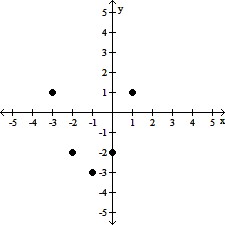Add the integers.21 + (-19) + 25 + (-15)
A. 12
B. 80
C. -38
D. -8
Answer: A
You might also like to view...
Determine which of the fundamental laws of algebra is demonstrated.(5 + 2) + 4 = (2 + 5) + 4
A. Distributive B. Associative C. Identity D. Commutative
Solve the problem.The percent of concentration of a certain drug in the bloodstream  after the drug is administered is given by K(x) =
after the drug is administered is given by K(x) =  . At what time is the concentration a maximum?
. At what time is the concentration a maximum?
A. 4 hr B. 2.5 hr C. 4.9 hr D. 7 hr
Solve the equation. Round to the nearest thousandth.133(1.43)x/7 = 266
A. {3.612} B. {11.625} C. {13.565} D. {15.505}
Tell whether a linear model or a quadratic model is appropriate for the data. If a quadratic model is appropriate, then decide also whether the lead coefficient should be positive or negative.
A. Quadratic; leading coefficient negative B. Quadratic; leading coefficient positive C. Linear